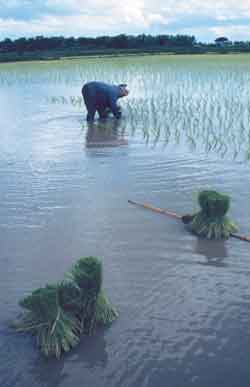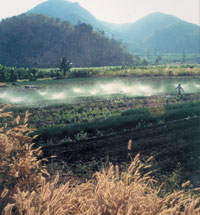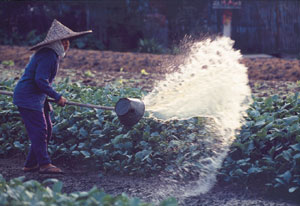Water:
source of food security
Each year on 16 October, the Food and Agriculture Organization of the United Nations celebrates World Food Day - in commemoration of its founding on that day in 1945. The World Food Day/TeleFood theme for this year, Water: Source of Food Security, recognizes the essential role freshwater plays in feeding the global population and ensuring food security - having regular access to enough high-quality food to lead active, healthy lives. Currently, more than 800 million people do not have enough to eat.
Limited access to water is increasingly becoming a constraint to food production. Water covers three quarters of the Earth, but only a small fraction is accessible as freshwater. Of the total amount of water withdrawn, agriculture claims almost 70 percent to produce the food that fuels human activity. As population grows, so too will food needs. FAO estimates that by 2030, the world will require 60 percent more food. About 80 percent of that increase will come from intensified agriculture supported by irrigation.
But water is already scarce in many countries. An FAO study of 93 developing countries indicates that a number of nations are already withdrawing water supplies faster than they can be renewed. Ten countries are in a critical state meaning they withdraw more than 40 percent of their total water resources for agriculture and another eight are water stressed, withdrawing more than 20 percent. At the same time, the competition for water from industrial and domestic users continues to grow.
FAO is convinced that the solution to meeting future food and water needs is to improve agricultural productivity and water use efficiency. By using better seeds, boosting soil fertility and improving on-farm water management, farmers produce higher yields, obtaining the greatest gains from precious water supplies.
 But even where water is plentiful, access to it is not always equitable. For example, special attention should be paid to women, who represent the majority of the developing world's farmers yet are often excluded by tradition from owning land and managing water.
But even where water is plentiful, access to it is not always equitable. For example, special attention should be paid to women, who represent the majority of the developing world's farmers yet are often excluded by tradition from owning land and managing water.
Another concern is keeping water use within limits, so that use in one area doesn't deprive people of access in another. Environmental impacts must also be kept to a minimum: while irrigated agriculture can yield two to three times as much as rain-fed lands, attention must be paid to proper drainage in order to prevent water-logging and salinity build-up.
At the same time, agriculture must compete for water with municipalities and industry. Currently, industry claims about 20 percent of total water withdrawals and municipal users the remaining 10 percent. Agriculture will be under increasing pressure to use water more efficiently and to improve the quality of the water that it returns to watercourses and aquifers.
 Improving irrigation efficiency will also be vital. The most common forms of irrigation - flood and sprinkler irrigation - can result in more water being applied than can be taken up by crops. More efficient and localized methods such as drip irrigation, which put water only where it's needed, can significantly reduce agricultural water demand. Rain-fed agriculture benefits from agricultural practices adapted to uncertain water availability. By constructing water harvesting structures ranging from small furrows to dams, farmers can conserve rainwater and direct it to crops. This practice can boost yield two to three times over conventional farming.
Improving irrigation efficiency will also be vital. The most common forms of irrigation - flood and sprinkler irrigation - can result in more water being applied than can be taken up by crops. More efficient and localized methods such as drip irrigation, which put water only where it's needed, can significantly reduce agricultural water demand. Rain-fed agriculture benefits from agricultural practices adapted to uncertain water availability. By constructing water harvesting structures ranging from small furrows to dams, farmers can conserve rainwater and direct it to crops. This practice can boost yield two to three times over conventional farming.
Policies and strategies to guide agricultural water use are needed on the international, national and local level. And when major sources of water cross borders, international agreements help to regulate how much water is allocated to each country or region. At the same time, existing local traditions of water management and access need to be respected and incorporated into policies and supporting legislation.
 To back up new water policies, investment is required. National governments will need to establish the conditions to attract such investment. Innovative forms of credit will help the poor to take advantage of improved water management techniques.
To back up new water policies, investment is required. National governments will need to establish the conditions to attract such investment. Innovative forms of credit will help the poor to take advantage of improved water management techniques.
Water is one of the most pressing issues in development today. The choice of this year's World Food Day/TeleFood theme, Water: Source of food security, serves as a call to governments, civil society and the international community to recognize the importance of water in achieving food security. World Food Day and TeleFood activities around the globe will help to deliver this important message about water while promoting the overall objective of this annual event: to raise awareness about the problem of hunger and to work towards long-term solutions to guarantee food for all.
FAO looks forward to commemorating the upcoming International Year of Freshwater in 2003. And FAO will be present at the 3rd World Water Forum in Japan next year where it will deliver this message: We can find enough water to feed the world, but we must pool our resources and strengthen our commitment to improve water management for agricultural production.